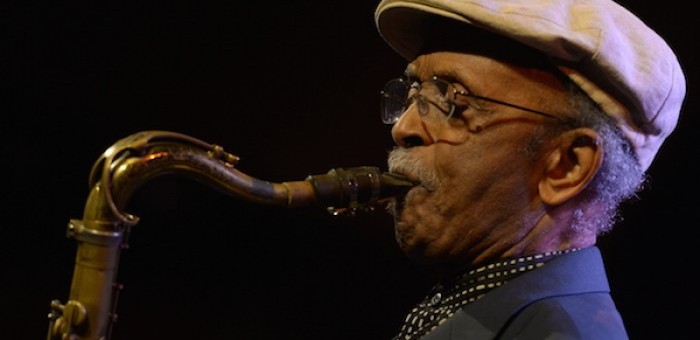Jan 13, 2026 2:09 PM
More Trump-Kennedy Center Cancellations
The fallout from the renaming of the John F. Kennedy Center for the Performing Arts to include President Donald…

Jimmy Heath performs at a tribute to producer Orrin Keepnews at Dizzy’s Club Coca-Cola in New York on Sept. 8.
(Photo: Frank Stewart/Jazz at Lincoln Center)Presented as part of the seventh annual Coca-Cola Generations in Jazz Festival, Dizzy’s Club Coca-Cola offered its tribute to the late producer and record label executive Orrin Keepnews Sept. 8 to an SRO audience of fans, friends and family.
A founder of the Riverside, Milestone and Landmark labels, four-time Grammy Award winner Keepnews worked with Sonny Rollins, Thelonious Monk, Cannonball Adderley and Wes Montgomery, among other jazz greats. The title to Bill Evans’ composition “Re: Person I Knew” was an anagram of Keepnews’ name. Keepnews died in 2015.
The tribute opened with Keepnews’ recorded dialogue: “We made records with [musicians] who would go out of their way to help each other. … They’re not my records; they’re the records of the musicians who made them. I did what I could to facilitate the making of them. I am very proud of a lot of what I did. And I think it has justified itself by the fact that it still exists.”
A hard-swinging performance by the trio of pianist Larry Willis, bassist Ray Drummond and drummer Akira Tana preceded recollections from Keepnews’ sons, Peter and David.
“My father was one the greatest jazz fans ever and an amateur in the best sense of the word,” Peter Keepnews said. “[An amateur] is somebody who does what he does more for love than for money. It’s not that my father didn’t want to make money. But he liked to tell a riddle: ‘The question is: ‘How do you make a million dollars in jazz?’ The answer is: ‘You start with 2 million dollars.’”
Saxophonist Jimmy Heath, whose first six recordings—The Thumper, Really Big!, The Quota, Triple Threat, Swamp Seed and On the Trail—were released on Riverside, played two of his classic compositions with the trio, followed by a regal solo performance from pianist Randy Weston.
“Let’s take a trip,” Weston said. He explained how he hadn’t planned to become a professional musician, but was offered a contract by Keepnews, who invited him to be one of Riverside’s first artists.
“[Keepnews and Riverside co-found Bill Grauer] were amazing people,” Weston said. “They recorded the sounds of sportscars. They recorded piano rolls, and exposed me to the older culture of this music. The cream of this music—Meade Lux Lewis, Jimmy Yancey. And they put out recordings of the Congo, and the Dahomey. So I recorded for Riverside in 1955, my first recording. I did five records for Riverside. We became great friends.”
Weston played two beautiful compositions, “Berkshire Blues” and “Little Niles,” the performances spanning styles, meters and moods.
Peter Keepnews read statements from his father’s friends.
Dan Morgenstern wrote: “It was Orrin who first brought Thelonious Monk into full view as the genius he was. … I will think of Orrin every time I order Stoli on the rocks. Orrin Keepnews was one of the greatest producers the music was lucky to find.”
McCoy Tyner’s note read, in part: “I will always remember the magical moments that were created and the projects we were blessed to make together. Fortunately they have stood the test of time and will hopefully be enjoyed for generations to come.”
Sonny Rollins wrote: “Orrin Keepnews worked hard during his lifetime to bring a dignified jazz to a sleeping public. We will all miss him.”
When saxophonist Gary Bartz, pianist Larry Willis, bassist Rufus Reid and drummer Jack DeJohnette took the stage, Bartz recalled how he was signed to Milestone Records, Keepnews’ second record label.
“I got to New York and looked in the Yellow Pages—I didn’t know any better,” Bartz said. “I called Orrin, who said, ‘If you don’t find a deal in two years, call me.’ Two years later I hadn’t, so I did. He gave me my first record date.”
From behind the drums, DeJohnette said: “Orrin asked me to come up with a concept for a record, and I did. Orrin was very interested in the personnel; I had Roy Haynes and Stanley Cowell on the record, which was called The DeJohnette Complex. Orrin was very encouraging. No one else would give me the time of day, but Orrin was right there, supporting me. He loved the music; he was open. He really made a great contribution.”
The quartet played a hard-charging version of “It Don’t Mean A Thing If It Ain’t Got That Swing,” closing the night perhaps as Keepnews would have liked, swinging to a sold-out club on a late-summer night in New York City.

Belá Fleck during an interview with Fredrika Whitfield on CNN.
Jan 13, 2026 2:09 PM
The fallout from the renaming of the John F. Kennedy Center for the Performing Arts to include President Donald…

Peplowski first came to prominence in legacy swing bands, including the final iteration of the Benny Goodman Orchestra, before beginning a solo career in the late 1980s.
Feb 3, 2026 12:10 AM
Ken Peplowski, a clarinetist and tenor saxophonist who straddled the worlds of traditional and modern jazz, died Feb. 2…

The success of Oregon’s first album, 1971’s Music Of Another Present Era, allowed Towner to establish a solo career.
Jan 19, 2026 5:02 PM
Ralph Towner, a guitarist and composer who blended multiple genres, including jazz — and throughout them all remained…

Rico’s Anti-Microbial Instrument Swab
Jan 19, 2026 2:48 PM
With this year’s NAMM Show right around the corner, we can look forward to plenty of new and innovative instruments…

Richie Beirach was particularly renowned for his approach to chromatic harmony, which he used to improvise reharmonizations of originals and standards.
Jan 27, 2026 11:19 AM
Richie Beirach, a pianist and composer who channeled a knowledge of modern classical music into his jazz practice,…